Английская лексика на тему музыки
1. Questions about music
Do you like music? — Вы любите музыку?
Can you play any instrument? — Ты умеешь играть на какому-нибудь инструментах?
Do you like singing? — Ты любишь петь?
What is your favourite type of music? — Какая ваша любимая музыка?
What genre of music do you listen to? — Какой жанр музыки ты слушаешь?

2. Actions
to sing along
to sing karaoke
an earworm — навязчивая мелодия
It’s just an earworm. — Это просто навязчивая мелодия.
to get stuck in your head
to have taste in music — иметь вкус к музыке
to be tone deaf — медведь на ухо наступил (быть глухим)
set my favourite song as a ringtone — установить мою любимую песню в качестве мелодии звонка
to own a lot of vinyl — иметь много виниловых пластинок
to own a lot of records — иметь много записей
to own a lot of physical albums — иметь много альбомов (физических альбомов)
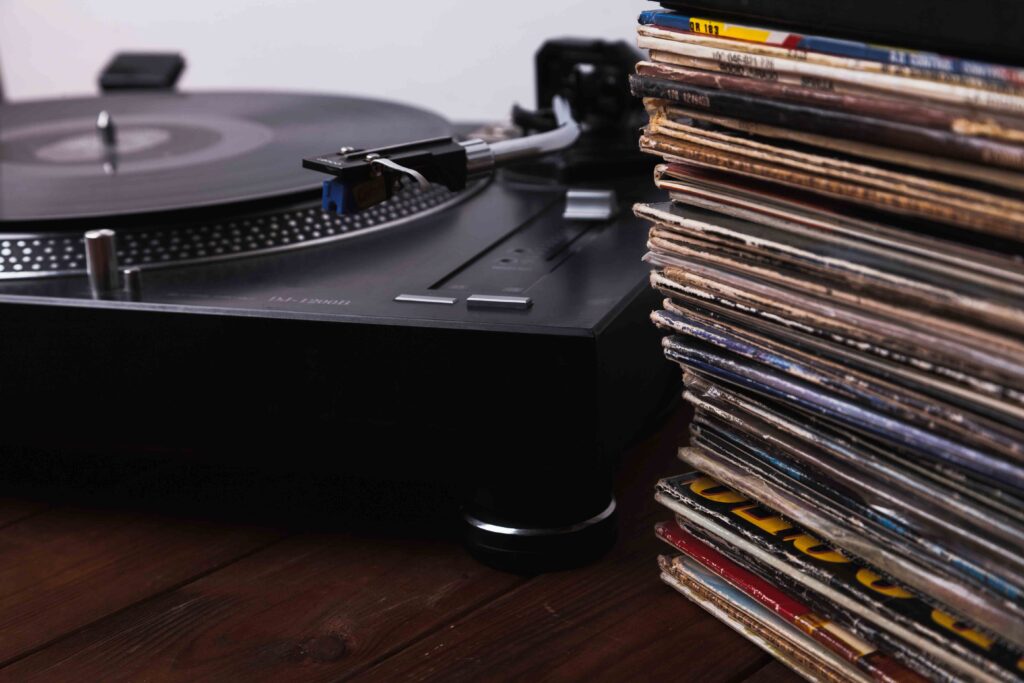
3. Words to describe the type of music
fast tempo — быстрый темп
The song is so upbeat.
a complex song — сложная песня
heavy music — тяжелая музыка
loud music — громкая музыка
relaxing music — расслабляющая музыка
soft music — мягкая музыка
piercing music — пронзительная музыка
hurt your ears — навредить твоим ушам
rhythmic music — ритмичная музыка
uplifting music — воодушевляющая музыка
melancholic music — меланхолическая музыка
catchy music — запоминающаяся музыка
lively music — живая музыка
harmonic music — гармоническая музыка
make you fell better (happier) — делать тебя счастливее, чувствовать себя лучше
It has a pleasing melody. — У него приятная мелодия.
That sounds awful. — Это звучит ужасно.
It makes my ears hurt. — У меня болят уши.
That’s too much of noise than music. — Это шум, а не музыка.
It heals. — Она исцеляет.
It stirs up my imagination. — Она будоражит мое воображение.
It’s rejuvenating. — Она делает моложе.


4. Концерты
a concert — концерт
a gig — концерт
live show — прямой эфир

5. Люди
a musician — музыкант
a band — музыкальная группа
women performers — женщины-исполнители
a vocalist — вокалист
a singer — певец
an artist — исполнитель
a music lover — любитель музыки
a music buff — любитель музыки
a music expert — музыкальный эксперт
to pick certain tunes — выбирать определенную мелодию
to develop a deeper understanding of music — развить более глубокое понимание музыки
to explore different genres of music — исследовать разные жанры музыки
an album — альбом
a record — запись
vinyl — виниловая пластинка
a vinyl lover — любитель виниловых пластинок
CD
physical music

6. Составляющие музыки
a tune — мелодия
to play a tune — сыграть мелодию
rhythm — ритм
a good track (song) — хороший трек (песня)
catchy beat — запоминающийся ритм
to like a beat of that song — любить ритм этой песни
fast tempo — быстрый темп
slow tempo — медленный темп
the sense of rhythm — чувство ритма
a downtempo song — тихая (спокойная) песня
7. Успех
a record label — звукозаписывающая компания, студия звукозаписи
a small record label — небольшая студия звукозаписи
to have a massive hit — иметь огромный успех
to have a huge (giant) following/fan base — иметь огромную (гигантскую) базу подписчиков / фанатов
to getting signed by a record label — подписать контракт с лейблом
Many girls are head over heels in love with him. — Многие девушки по уши влюблены в него.
head over heels — по уши
8. Top 10 genres of Music Industry
8.1. Electronic Dance Music — Электронная танцевальная музыка
be produced by DJs
add dozens of tones to a piece to create unique music
hear them in clubs
was known in the form of Jamaican dub music
8.2. Rock Music
has been rocking the world since the 1950s
started actually around string instruments
Its loud and strong beats make it popular among the youths.
Rock bands:
Metallica, Pink Floyd, Nirvana, The Doors
8.3. Jazz
has its roots both in the West African and European culture
Originating in the late 19th to early 20th century.
Women performers:
Ella Fitzgerald, Betty Carter, Abbey Lincoln and Ethel Waters
8.4. Dubstep — Дабстеп
falling in the electronic music genre
8.5. Rhythm and Blues — Ритм-энд-блюз
Vocalists:
Rihanna, Mariah Carey, Beyoncé, Usher and the legendary Michael Jackson
be a combination of hip hop, funk, dance, pop and soul focusing on themes like relationships and freedom
8.6. Techno — Техно
the use of technology today has greatly enhanced the quality of techno style music and popularizing it among people day by day
8.7. Country Music — Кантри-музыка
to be a popular genre of American music which originated in the 1920s
having its roots from American folk and western music
using simple forms of instruments ranging from electric and steel guitars to drums and mandolin or mouth organ
Music singers:
Kenny Rogers, Shania Twain, Johnny Cash Taylor Swift
8.8. Electro — Электро
It is a blend of hip hop and electronic music. — Смесь хип-хопа и электронной музыки.
using a drum machine, vocoder and talkbox
Notable artists who have been into this form of music:
Arthur Baker, Freeez, Man Parrish and Midnight Star
8.9. Indie Rock — Инди-рок
It was originated in the 1980s and has gradually changed the music industry.
8.10. Pop Music — Поп-музыка
This form can include any form of music ranging from urban and dance to rock, country and Latin.
Instruments highly used are electric guitars, synthesizer drums as well as bass.
8.11. Classical Music
J.S. Bach — St Matthew Passion
Tchaikovsky — Symphony No. 6
Beethoven — Grosse Fuge
Mozart — Requiem
8.12. K-pop
Kpop is Korean popular music.
9. Types of musical instruments
9.1. Percussion instruments — Ударные инструменты
the piano, the xylophone, the cymbals
9.2. Wind instruments — Духовые инструменты
the saxophone, the flute, the trumpet, the clarinet
9.3. Stringed instruments — Струнные инструменты
the guitar, the violin, the cello
9.4. Electronic instruments — Электронные инструменты
the Xth Sense
9.5. Membranophones — Мембранофоны
Cylindrical drums, barrel drums, hourglass drums
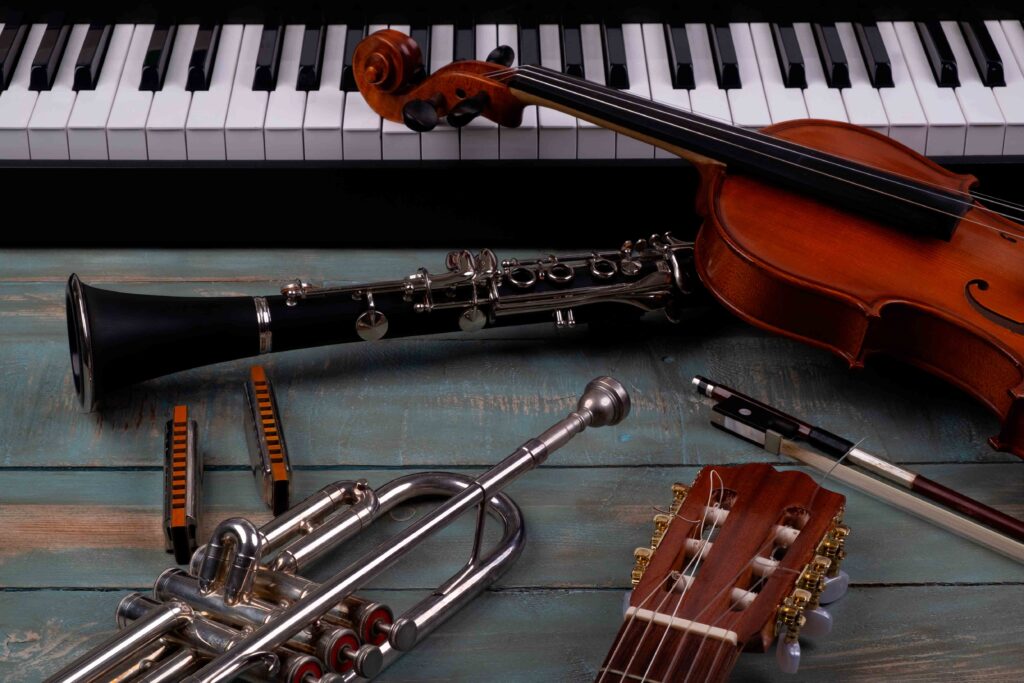
10. Apps for listening to music
Amazon Music (free/subscription)
Spotify (free/subscription)
Apple Music (subscription)
YouTube Music (free/subscription)
Bandcamp (individual purchases)
Shazam (free)
11. Benefits of Learning a Musical Instrument
11.1. Creativity
produce your music out of artistry
11.2. Memory Skills
can help exercise your brain
11.3. Boosts Your Confidence
need to perform in front of your fellow students, teachers, or family and friends
11.4. Coordination Skills
stimulating your brain and body to communicate with your mind, hands, and eyes
11.5. Maths
enhancing the sense of rhythm, beat, and scale. These are critical factors that stimulate your problem-solving skills.
11.6. Improved Academic Achievements

Репетитор английского языка
We all love music.
We all have our favourite songs that we love to listen to. Singers and bands that we really care about and return to their music again and again.
But how to talk about all of this music? How to express in English your admiration for your all-time favourite singers or bands?
For English students, this can be a real challenge.
So I have prepared this simple guide to help you talk about music. In the next few pages I will show you:
- Basic vocabulary for music
- Some common words and phrases when talking about music
Then I will cover
- How to talk about the sound of music
- How to express how it makes you feel
Finally, I introduce
- How we listen to music from the past to the present
Then at the end, there is a big list of questions to help you practise talking about music with your friends or by yourself.
Are you ready? Let’s dive in.
Basic Vocabulary for Music
It’s probably a good idea to look at some basic vocabulary for music first.
We need to have a good understanding of the most basic words and phrases before moving on to more challenging vocabulary.
Note
Music is made up of a series of notes. A musical note is a sound that has a defined pitch.
Any song you hear needs musical notes. Without notes, there is no music at all.
Musical notes come in different pitches or sounds. The basic scale of music is made of seven notes — A, B, C, D, E, F and G. The basic C scale is C up to B — C, D, E, F, G, A and B.
I love the singer from Gravity 8. She can really reach all those high notes.
The guitarist in RoadRage is fantastic — he plays so fast all the notes sound like one.
Chord
A chord is made of a group of notes played together in a song.
Most chords are made up of three notes together, but there can be chords with two or four notes.
Chords have a sound that is very pleasing to the ear. All the notes played together — for example, on a piano or guitar — have a very pleasant sound that makes us think these notes belong together.
I love the piano chords at the beginning of the song Temptation — they sound so beautiful.
Harmony
Harmony is the arrangement of the notes and chords played together that has a very pleasing sound to the human ear.
We can also describe harmony as the sound of two or more voices singing together. The singers may all be singing different notes, but they all sound good together.
Have you heard the new song by Generation Z? In the chorus, they all sing together in great harmony.
Tune
This is a series of notes played together in a sequence that sounds good to our ears. We might also use the word melody, but tune is more common. All songs have a tune that we can sing along to and recognise.
In English, we might also describe a song as a tune.
I love this tune!
I can’t get that tune out of my head…
The radio has been playing this song all day.
I like the new tune by The Beats. It’s really great!
Rhythm
These are the common regular pulses or beats that we hear in the music. Rhythm is the sound that makes us nod our head, tap our feet or click our fingers.
Rhythm is the sound in music that people dance to.
All popular music has a strong sense of rhythm.
I love the rhythm to this song — it makes me want to dance.
I love the strong rhythm of the song Black Rain. It sounds like thunder.
Lyrics
Lyrics are the words to a song. There are usually two parts of the song’s lyrics — the verse and the chorus.
The chorus often has lyrics that are easy to remember and make us want to sing along with the singer or the band.
Most pop song lyrics are very simple — usually love songs or songs about friendship or positive elements in life.
But some song lyrics can be very complex or poetical.
I love the lyrics to this song — so powerful.
I love the lyrics to the songs of Meredith Jacobs. They all sound like poetry.
Chorus
This is the part of the song that is repeated again and again in the song. It makes us want to sing along.
It is easy for us to remember the words, and we feel engaged with the song when we hear it.
As soon as I hear the chorus to Wonderland, I have to start singing along with it.
The chorus to the new song by Dan White is really catchy. I know all the words and I’ve only heard it five times.
Common Words and Phrases to Talk about Music
Now we have a basic understanding of common words used in music, let’s look at some vocabulary people often use when talking about music.
Turn It Up!
Essentially, this means increase the volume or make it louder.
Imagine you are in your friend’s home and a song comes on that you love.
What would you say to your friend?
That’s right: Turn it up!
You want to hear this song louder because you really like it. You want to hear more of it.
You could also say:
Turn this one up (turn this song up)
Turn the music up (make the music louder/increase the volume)
This Song is So Catchy!
When we use the word catchy to describe a song, it means that the song’s lyrics are easy to remember. But also that the tune of the song sounds great and something that we want to sing along to.
If a song is catchy, it means that the song is very popular and any time you hear it you want to turn it up.
I Can’t Get This Tune Out Of My Head
This means you love the song so much that the tune is constantly playing inside your head. Or you are humming the tune as you walk down the street or take a shower.
You love this song so you want to play it on your music system or on your smartphone at least ten times a day.
I Love This One!
This one refers to the song or tune. You hear a song playing — could be on the radio, in a shopping mall, on your friend’s smartphone — and you love it, so you use this expression.
I Can’t Stand This Song…
And this is if you really dislike the song.
You hear this song playing, but you hate it. So you can say: I can’t stand this song!
This Band is So Cheesy…
Cheesy in English is used to describe things that we dislike or that we think are low quality. It can also refer to things that are cheap, unpleasant or corny.
So if you see a band on the TV that you think fit into this category, you can say: This band is so cheesy!
We might often describe bands that sing overly sentimental love songs or boy bands as cheesy. They are not to everyone’s taste.
This Band is Really Grungy…
Equally, we might describe a band as grungy. It means they are kind of dirty and unkempt. Their clothes are not fashionable and the singer is not even good-looking — he looks kind of ugly with greasy hair!
So we say: This band is really grungy!
Oh, This Song is a Classic!
Classic is used to describe things that are very old and have great value.
So you hear a song and you love it. The song could be old — or maybe just a very popular song from last year — and so you may regard it as a classic.
And that is when you say: This song is a classic — turn it up!
I Love This Track!
Years ago people listened to songs on vinyl records and CDs.
The songs were separated into tracks. So that is why people often refer to songs as tracks. This expression just means that you love the song.
This Song Gets on My Nerves…
If something gets on your nerves, it means it makes you feel very uncomfortable or irritable.
Maybe a song comes on the radio and you hate it. You hear it and it makes you angry because it is so unpleasant.
So you say: This song gets on my nerves!
There are many words we can use to describe the unique sounds of different types of music.
Let’s look at some of them.
Sound of Music
|
gentle |
soft |
strong |
|
loud |
rich |
deep |
|
distinct |
melodious |
resonant |
|
raucous |
brassy |
piercing |
|
mellow |
smooth |
thick |
|
shrill |
warm |
natural |
|
strident |
harsh |
clear |
|
reedy |
dark |
flat |
|
bright |
thin |
light |
|
rounded |
full |
breathy |
Exercise
Look up all the words in a dictionary and find the meaning to describe music. Be careful — many of these words have more than one meaning.
After you look the words up, try to make your own sentences to describe music you like. Try to describe music you don’t like too.
Tempo of Music
We can also describe the tempo of music. This is the speed or the rhythm of the music.
|
fast |
slow |
diminishing |
|
rapid |
double time |
lively |
|
brisk |
stately |
melancholic |
|
quick |
moderate |
gradual |
|
energetic |
joyful |
even |
|
frantic |
upbeat |
steady |
Exercise
Now look up these words to describe the rhythm or tempo of music. Again, take care of the correct meaning of these words — lively, moderate and frantic, for example, will have more than one meaning.
Make sure you find the correct meaning of each word as it is related to music.
When you find the correct meanings, try to write sentences of your own to describe the rhythm of music.
People Talking About Music
Look at the following extracts of people talking about songs or music they like.
The track starts with this really fast guitar. The high notes are piercing and loud. The guitarist picks out notes so fast it sounds frantic. It just introduces the song perfectly — full of energy.
I love the saxophone in this song. It has a really rich and resonant sound to it. It adds a great level of warmth to the whole song and at the end of the solo, it sounds mournful and melancholic.
This dance track has a clear and lively rhythm. As soon as I hear it, I feel part of it. There is a kind of sadness in the first verse, but when the singer gets to the chorus, the mood changes and it becomes more joyful and upbeat.
There is a rich and natural sound to the acoustic guitar in this tune. It has a soft sound, but it also has a very deep and warm feel to it. The rhythm is very gradual but builds into a steady, marching beat that becomes quite brisk towards the end of the song.
The piano and drums play at the same tempo. A great, crushing rhythm that sounds like thunder. Then the guitar comes in at double-speed and the rhythm picks up in rapid time. But the bass plays with a thick, smooth sound that sounds completely separate from the other musicians. It gives the song a really rounded, full atmosphere.
I love the gentle strings at the beginning of the song. They sound breathy and natural, like human voices. Then the piano plays a mellow melody, at times dark and mysterious, other times warm and light like air.
The track has a very distinct sound, but the singer’s voice is flat and reedy. At times her voice sounds shrill as she reaches for the higher notes. But the bass and drums work well together, playing in a slow and steady rhythm as one.
Read through all the extracts above. Highlight all the words that describe the sound or rhythm of the music.
Now You Try
Think of FIVE of your all-time favourite songs. They can be any songs you like.
Now describe them.
Use as much of the vocabulary from the previous exercise and use the extracts above to help you.
When you have finished writing a description of each song, read it out loud to yourself.
Describing the Effects of Music
Just as we can talk about the sound of music and how it sounds to our ears, we can also talk about the effect music has on our emotions or mood.
Let’s look at some words we can use to describe this.
|
calming |
stimulating |
invigorating |
|
rejuvenating |
soothing |
exhilarating |
|
inciting |
uplifting |
empowering |
|
restoring |
healing |
enlightening |
|
exciting |
frightening |
improving |
|
focusing |
relaxing |
stirring |
Exercise
Look up each of these words in your dictionary. Make sure you find the correct meaning of the word as related to music.
Some of the words have more than one meaning, such as calming, uplifting and healing.
When you have all the correct meanings written down in your notebook, write sentences of your own to describe the feeling of music.
People Talking About the Effects of Music
Let’s take a look at some extracts of people talking about the effect music has upon them.
If I am reading or studying, I like to listen to music that has a calming effect. So I often put on some ambient music. It has a very quiet, sometimes meditative feel about it and helps me to concentrate on what I am reading.
I am a big fan of Motown soul music. Sometimes it has a kind of gospel sound to it. If I am in a low mood I like to put on some Motown music — it can be very uplifting.
In the evening, after a hard day at work, I like to unwind by listening to some jazz music. I find it very relaxing and I can get lost in my thoughts as the soft tunes go through my mind.
If I had to choose my favourite kind of music, it would be heavy metal. The louder and faster the better. I just love the screaming guitars and loud drumming. It is very exciting.
I really like to listen to classical music. I sit down and just lose track of time. I find it very emotional and stirring.
Now You Try
Think about the kind of music you like. Choose FIVE songs or pieces of music that you love to listen to again and again.
Now write some sentences about how you feel when you hear these songs.
- What emotions do you feel when you listen to this music?
- Does it make it you feel excited? Or relaxed? Or some other feeling?
Write down all your sentences in your notebook. When you have finished, practice by saying all the sentences you wrote out loud.
How We Listen to Music
Over the years, there have been many different ways for people to listen to the music they like in the comfort of their home.
Records/Vinyl
These were most popular after the second world war. In the sixties and seventies, they were at their peak. Music fans would always buy their music on vinyl records.
They died out in the eighties but are now enjoying a renaissance.
To listen to records, people would have to buy a stereo system. These could be very expensive.
Music Cassette
Music cassettes took over from vinyl. People could listen to music cassettes on smaller, more portable machines. The Sony Walkman was popular at this time too. Music cassettes were popular in the eighties but then came…
Compact Disc/CD
The compact disc grew in the late eighties and by the nineties was the standard for all music fans.
People could listen to CDs via their stereo system. Or through a portable CD player.
Digital Download
With the advent of more sophisticated technology, it wasn’t long before people were downloading music off the internet for free. This caused great concern in the music industry, so they had to adapt.
Streaming Music
Now we have streaming platforms where we can listen to whatever music we want whenever we want. And usually via our smartphone. No need for expensive stereo equipment!
This is the way most people listen to music today.
There are streaming platforms in most countries. In western countries, these include Spotify and Soundcloud.
But many people listen to music via YouTube, as there are no fees to pay.
Now You Try
- How do you listen to music?
- Do you use a music streaming service? Or YouTube?
- Or do you like to collect old vinyl records?
Questions about Music
Go through all of these questions about music.
Try to speak out loud your answers. If you can’t do that, then write your answers down, then speak them out loud.
What kind of music do you like?
Name your favourite band or singer. Why do you like them?
How often do you listen to music?
When do you normally listen to music?
How do you listen to music?
Where do you listen to music? Why in this place?
What different styles and genres of music do you like? Why do you like these styles of music?
What kind of music do you hate? Why?
What kind of music do you listen to if you want to relax?
What kind of music makes you feel excited? Why?
What kind of music do you like to dance to?
Do you prefer songs in your language or English? Why?
How would life be without music?
How does music make you feel?
If you were a song, what song would you be and why?
Conclusion
So that is it.
This is by no means a complete guide on how to talk about music, but I hope it gives you a good start.
Please go over all the vocabulary and make notes of the meanings of these words and phrases. Make sentences of your own and speak them out loud.
The more you make an effort, the more results you will see.
I hope it was useful.
And please —as always — leave a comment in the section below.
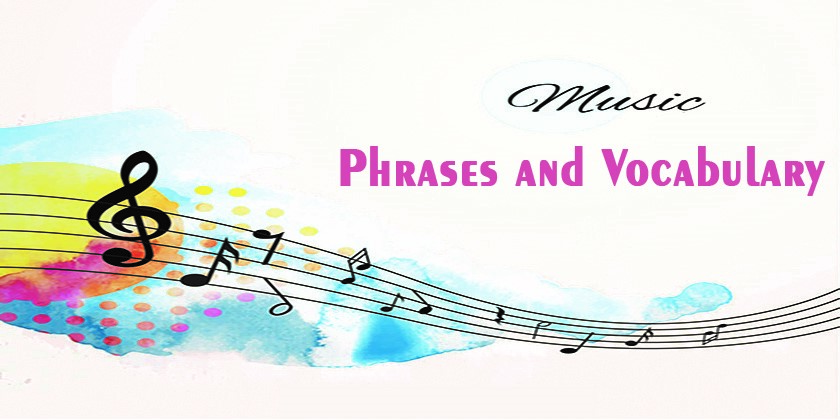
You can use these words and phrases to talk about music and the arts. Talk about your favorite music and famous music in your country. Moreover, ask your friends about their favorite music. The following English vocabulary and phrases relating to music and arts could be used beside your own words.
English Vocabulary And Phrases Relating to Music and Arts
| Word/phrase | Function | Meaning |
| Wind instruments | Noun | Musical instruments (such as a flute, horn, or organ) that are played by blowing air through it. |
| Brass instruments | Noun | Musical instruments (such as trumpets, trombones, and tubas) that are made of brass. |
| Stringed instruments | Noun | Musical instruments (such as a guitar, violin, or piano) that has strings and that produces sound when the strings are touched or struck |
| Percussion instruments |
Noun | Musical instruments (such as drums, cymbals, or xylophones) that you play by hitting or shaking |
| Jazz | Noun | A type of American music with lively rhythms and melodies that are often made up by musicians as they play |
| Orchestra | Noun | A group of musicians who play usually classical music together and who are led by a conductor. |
| Tempo | Noun | The speed at which a musical piece is played or sung |
| Face the music | Idiom | To accept and deal with the unpleasant result of something you have said or done (He knows that he’ll be criticized for making a bad decision, and he’s ready to face the music.) |
| It‘s like music to my ears |
Expressional phrase |
A pleasant sound or words/referring to something that you are happy to hear. (Her words were music to my ears. [=I was very happy to hear what she said) |
| Painting | Verb/Noun | The art or act of making pictures using paint |
| Poetry | Noun | The writings of a poet: poems. Poem: a piece of writing that usually has figurative language and that is written in separate lines that often have a repeated rhythm and sometimes rhyme |
| Acting | Verb/ Noun | The art or profession of performing the role of a character in a play, movie, etc.: the art or profession of an actor |
Singing |
Verb/ Noun | To use your voice to make musical sounds in the form of a song or tune |
| 1.Sculpture/2.Pottery | Nouns | 1. The processor art of carving or molding clay, stone, metal, etc., into a sculpture/A sculpture is a piece of art that is made by carving or molding clay, stone, metal, etc. 2. the art or activity of making objects out of clay (such as bowls, plates, etc.) |
| Play an instrument | Phrase | To make music with a musical instrument (such as a guitar, violin, flute, etc.) |
| Write music | Phrase | To write musical notes and compose a song. |
| Sketch | Verb/ Noun | To make a quick, rough drawing of something (He likes to sit outside and sketch.) |
| Genre | Noun | A particular type or category of literature or art (This book is a classic of the mystery genre.) |
Check out more common English phrases and vocabulary…
British people have a real passion for music and love to talk about the latest songs they have heard. As a result, there are many informal ways to talk about music that are commonly used in everyday speech. This article will present and explain 15 informal words and phrases for describing music which you are not likely to find in your English textbooks.
British people have a real passion for music and love to talk about the latest songs they have heard or music they already know and love. However, as a native speaker and teacher of English, I know that there are many informal ways to talk about music that are commonly used. In this article, I present 15 of these informal phrases and words to describe music that are not likely to be in your textbooks. So if you’re looking for music adjectives or words to describe a beautiful song look no further.
Firstly, I am going to introduce informal words for songs, secondly, words for expressing your musical likes and dislikes, thirdly, words related to dancing and music and finally, a quick way to describe music by turning music genre names into adjectives.
Informal Words for Songs
Tune
There are two ways to define tune, the traditional way is as follows: A melody, especially one which characterizes a certain piece of music.
If you use tune in this way you are referring to a part of the song. However, people sometimes will just say “tune” rather than song in everyday speech. The meaning is exactly the same. So when someone says, “I like the new Blur tune” they simply mean, “I like the new Blur song,” referring to the whole song not just a part of it.
Examples:
- The DJ played some great tunes yesterday.
- I heard a great tune on YouTube last night.
Track
Track can also simply be used instead of song. In the days of compact discs, the songs were numbered so you could easily find the song you wanted to listen to. People would say, “Tracks 2, 3 and 5 are good but skip tracks 4 and 7, they’re no good”.
Examples:
- The latest track by Blur is amazing!
- What was that track you just played? I liked it.
Banger
Banger is a word used mostly to describe electronic dance and hip hop music. You can use banger to refer to the latest club tunes. “Hey did you hear the new banger by Daft Punk? It will blow your mind”.
Examples:
- The new Jay Z track is a right banger!
- The Chemical Brothers first album has some bangers on it!
Classic
A song that becomes super popular can be called a classic. However, in everyday speech anyone can call a song a classic. There are no rules. So, if you hear a song and you really like it you can say “That song is a classic!” But be warned, this does not mean that other people will agree with you!
Examples:
- Dylan has got so many classics.
- Bob Marley made some classic records.
- Last night the DJ played all the ‘80’s classics.
Note, classic can also be used when talking about films, books or even experiences as well as music.
Anthem
This refers to a very popular song. In music festivals, when this type of song is played, most of the crowd will know all the words and sing along. If it is a dance track everyone will get up and dance to it. It is very similar in meaning to a classic but there is more of an emphasis on the song being loud and that you would sing along to it or dance to it, kind of like the national anthem, just way cooler.
Examples:
- Oasis has got some anthems.
- The new track by Calvin Harris is going to be a summer anthem.
So now we know there are a few different ways to call a song such as tune, track, banger, classic and anthem. Hopefully, knowing these variations can help you express yourself more like natives and has increased your understanding of musical terms.
Informal Phrases
Next, I am going to introduce five phrases that natives use to express their like or dislike of music( how to say a song is good or not).
Oh my God! That’s a wicked tune!
I remember when I was at school in the ‘90’s, my friends and I started saying wicked as an alternative to cool or great. The old meaning of wicked was bad and was often used like this by the older teachers, “That boy did a wicked (bad) thing”. As young people do, the meaning was changed so when someone says “That was a wicked tune” they mean “That was a cool/great tune”. This a one way that you can use when you don’t know how to describe a song you love.
Why do we say it this way? I guess at first, just to be different from our parents and teachers, and then later it just became a habit.
Examples:
- The Gorillaz is a wicked band.
- The DJ on Saturday will be wicked.
- The club last night was boring. They didn’t play any wicked tunes there.
Lastly, wicked can be used in a non-musical context. So if your friend suggests you meet up and hang out, you can reply, “Wicked, let’s do it!”
What a sick tune!
Have you ever heard someone say “What a sick tune!” and wondered what they meant? Well, they didn’t mean the drummer had thrown up all over the drums and somehow that got recorded onto the final cut of the record. Actually, sick also just means great, cool or amazing. So, next time you hear a song you like on the radio, on YouTube or in the club you can tell your friends, “Wow I just heard a sick tune”. You might also hear people say, “That was the sickest (greatest) thing I have ever heard”.
Examples:
- Goldie has made some sick tunes.
- The Beastie Boys were the sickest.
Just for your notes, skaters or other adrenaline sports junkies might say “Hey, did you see that trick, it was sick!” The meaning is the same: “It was amazing!”
Last night, the band we saw had some killer tunes
For every DJ or band when they go to play a gig they must have some killer tunes to play to their audience. But, what are killer tunes? A simple definition is that these are the DJ’s or bands best songs. But this doesn’t mean that any killing is going to take place! No, it is a metaphor meaning these songs are so good that they cannot be compared to any other songs. They would metaphorically kill off any competition. ( now you know, how to say a song is good)
Examples:
- It was amazing, the DJ played killer tunes all night long.
- They are a good band. But they haven’t got any killer tunes.
Turn it off, it’s too cheesy!
If the music is very simple and without subtlety, and/or the lyrics are corny and obvious (“I will always love you”, “You are my one and only,” etc.) you can say “This music is cheesy”, and accompany this phrase with a pretend sick noise “Urgh” for added effect. Just joking, you don’t need to do this last bit!!
So, when I look back at the music of my youth a lot of times I think, “That music is so cheesy, I can’t believe I liked it!”
It is not all negative though, liking cheesy music can also be a reminder of good times. In this case, you could say, “That music is so cheesy, but I don’t care I love it!”
Examples:
- This music is very cheesy.
- The lyrics are too cheesy.
You can also just say cheese which is simply the noun form.
Examples:
- I can’t listen to this radio station, all they play is cheese.
- The DJ played cheese all night long.
If you need examples of cheesy songs check out; ABBA: “Dancing Queen”, Survivor: “Eye of The Tiger” or anything by the Spice Girls.
It’s not really my thing
If someone asks you, “Do you want to listen to the new One Direction album?” you may instinctively want to reply, “No, I would rather eat a bowl full of broken glass.” But, you don’t want to annoy the person asking, so instead you can use the phrase, “It’s not really my thing”. It has a soft and indirect meaning, but still means no. By saying “not really my thing”, you are being vague as to the reason why you don’t want to listen to the song, therefore avoiding any clash with the other person.
Example:
Friend 1: Do you want to go to a heavy metal gig tomorrow?
Friend 2: Sorry, it’s not really my thing
Again like wicked and classic, this phrase can be used in other conversations such as when talking about films or books.
So those were five informal phrases that can be used to express our likes and dislikes about music. In the next section, I will introduce some words and phrases you can use for music that makes you want to dance. Then the article finishes with a quick and easy way to make adjectives from the names of music genres.
Words and Phrases Related to Dancing:
That groove is amazing!
Oxford dictionaries (2015) define groove as: a particular rhythm in popular or jazz music. In everyday usage, if you listen to a song and the rhythm makes you want to dance, it’s likely that the song has a good groove. So, when your head starts to move in time with the music, or you start to tap your feet you would be, feeling the groove, meaning you are getting yourself into the rhythm of the music.
Examples:
- Great groove on that track.
- We were grooving all night long (verb form meaning: dancing or enjoying the music).
- This rhythm is really groovy (adjective form).
That is a funky tune
What is a funky tune? The definition in the Oxford Dictionary (2015) is: music that has, or uses a strong dance rhythm, in particular that of funk.
Examples of funky music are those made by any funk musician (James Brown, Parliament, George Clinton, etc.) but also some music by pop artists like Madonna. Funk rock bands like the Red Hot Chilli Peppers and dance music such as house and techno tunes can be funky. Generally speaking, when people say music is funky in everyday speech, they are usually just saying this music is good to listen and dance to.
Examples:
- I love to listen to funky tunes.
- Heard anything funky lately?
- The DJ played some funky tunes, we danced all night.
Next Saturday, there’s a wicked rave happening!
So, we have looked at wicked already. It’s just a superlative, a word that makes the thing that follows sound good or special. But, how about the following word, rave?
Well, a rave in today’s language is a large electronic dance music party. When you go to a rave you might hear house, techno, dubstep, drum and bass music, or one of the other many genres of electronic music.
In the late ‘80’s and early ‘90’s in the UK, raves might have been in fields in the summer time, but now they are more likely to be in super modern clubs with superstar DJ’s.
A person that goes to a rave is called a raver, and rave can be used as a verb as well, you can say, “I love raving!” So, next time you go to an all-night party with electronic dance music and DJ’s and you end up dancing all night, yes, you are now a raver!
Examples:
- I’m going raving this weekend.
- I love rave music.
- I was a raver.
Who feels like throwing some shapes?
So, imagine you are having a good time with friends listening to music. Your friend asks you, “Do you want to throw some shapes?” You don’t know what she means. Throw shapes? Surely she doesn’t mean she’s going to get a triangle, a square and a circle out of her pocket and throw them at you, does she?
Well, actually no, what she’s asking you is, “Do you want to dance?” So when someone next asks, “Do you to throw some shapes?” You can reply, “Yes, as a matter of fact I do!!”
Examples:
- We were throwing shapes all night.
- She can really throw some shapes.
- I love throwing shapes.
How to Describe Music: Add a -Y
The last of the fifteen words is not actually a word but a letter: the letter -Y. If you think that describing music is hard, you can just add a -y to the name of the genre and you have made it into an adjective. Then, you are able to describe music in a very simple but effective way.
Here are some examples of how to do this:
- Blues: Bluesy
- Folk: Folky
- Jazz: Jazzy
- Punk: Punky
- Pop: Poppy
Examples in sentences:
- My friend writes bluesy songs.
- I know you like folk music so I got you this CD. It’s very folky.
- Mark plays funky music.
- She likes jazzy music.
- That band last night was kind of punky.
- I like pop music but that is too poppy for me.
Also, I should explain that it is also perfectly fine to say “It was a blues tune, or “It was a funk tune”. By adding the -y, you are saying “The song is a little in the style of blues/pop/folk/jazz” or, “It has something of the blues/pop/folk/jazz about it.”
Lastly, with rock and rap music please be careful as we do not say, “That song is rocky” or, “That is a rappy tune.” Sorry, that’s the English language for you, full of irregularities that you just have to learn.
Summary
Now you’ve read some tips on how to speak about music like natives do. You have additional vocabulary you can use instead of plain song all the time. You can talk about the music you like, and I have introduced a few words related to music and dancing.
Hopefully, next time you have a music conversation, you can participate in the conversation more and also understand a little better what people are saying. Good luck with your language learning, and please get in touch with me if you want English lessons on italki!
Bye!
Image Sources
Hero Image by Jason Eppink (CC by 2.0)
Считается, что музыка — универсальный язык человечества, а английский — международный язык. В этой статье мы хотели бы совместить эти два понятия и рассказать вам о 10 наиболее часто употребляемых «музыкальных» идиомах английского языка. Выучите их и используйте в собственной речи.
To blow your own trumpet (to blow your own horn / to toot your own horn) — хвастаться, заниматься саморекламой.
Дословно — «трубить в свою собственную трубу/горн».
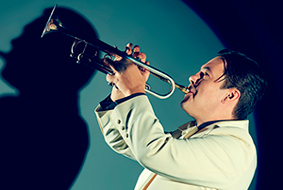
Так говорят о человеке, который хвастается своими достижениями или какими-то качествами, рассказывает, какой он успешный и замечательный.
История идиомы:
Это выражение широко используется сегодня, хотя и появилось еще примерно в XVI веке. В те времена принято было трубить в горн при появлении монарха, богатой особы или по прибытии охотников с охоты. Этими звуками предупреждали, чтобы люди освободили дорогу, были готовы приветствовать монарха или особу из знати. Из-за этого выражение «трубить в горн» стало ассоциироваться с хвастовством, громкой саморекламой.
Пример употребления:
She’s always blowing her own trumpet. It’s so irritating!
Она всегда хвастается. Это так раздражает!
To ring a bell — напоминать, казаться знакомым, вызывать воспоминания.
Дословно — «звонить в звонок».

Так говорят в случае, когда какое-то действие, имя или слово о чем-то напоминают человеку, кажутся ему знакомыми.
История идиомы:
Есть две основные и вполне правдоподобные версии происхождения этого выражения. Первая связана с великим академиком Павловым, а вернее, с его собаками. Во время проведения опыта по изучению условного рефлекса звонил звонок и собакам давали еду. В дальнейшем звук звонка напоминал им о еде и у них выделялась слюна даже в том случае, когда научные сотрудники не приносили еду к ним в клетку.
Согласно второй версии, звук звонка сопровождает человека повсюду и постоянно ему о чем-то напоминает. Например, утром будильник напоминает, что пора вставать, дверной звонок напоминает, что пришли гости и надо открыть дверь, звонок в школе и университете напоминает, что началось или закончилось занятие. Отсюда и произошла «музыкальная» идиома ring a bell.
Пример:
The name “Patrick Franklin” rings a bell. I suppose I’ve met this man before.
Имя «Патрик Франклин» кажется знакомым. Я полагаю, я встречал этого человека.
To face the music — расплачиваться за свои поступки, расхлебывать кашу, держать удар.
Дословно — «смотреть в лицо музыке».
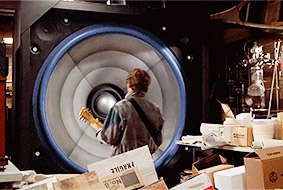
Так говорят, когда человек получает наказание, несёт ответственность за свои проступки или предстает перед теми, кто его критикует.
История идиомы:
История возникновения этого выражения довольно запутана. Есть как минимум две разные версии. Согласно первой, появлению этой идиомы о музыке мы обязаны военным. Когда кого-то увольняли из армии с позором, его провожали «на гражданку» под бой барабанов. При этом для особого унижения человека усаживали на лошадь задом наперёд. Таким образом, он получал своё наказание «лицом к музыке».
Согласно другой теории, идиома появилась в театре. Каждому артисту приходится выступать лицом к зрителям и оркестровой яме, а музыканты оркестра считаются самой искушенной и критичной публикой, ведь они видели тысячи выступлений. Поэтому выступать лицом к оркестру было настоящим испытанием, а выражение «лицом к музыке» (оркестру) приобрело негативную коннотацию.
Пример:
She broke my window and had to face the music and pay for it.
Она разбила мне окно и была вынуждена расплатиться за свой поступок и заплатить мне за него.
А теперь предлагаем ознакомиться с еще 7 идиомами о музыке на английском языке. Чтобы вам легче было их запомнить, мы привели русские аналоги этих фразеологизмов и примеры их употребления:
| Идиома | Перевод | Пример употребления |
|---|---|---|
| To blow the whistle | Доложить, сообщить, дать сигнал, поднять тревогу. | I blew the whistle because they tried to rob the bank.
Я поднял тревогу, потому что они пытались ограбить банк. |
| To play second fiddle | Быть на вторых ролях, играть вторую скрипку. | I hate playing second fiddle. I want to be the lead!
Я ненавижу быть на вторых ролях. Я хочу играть главную роль! |
| Fit as a fiddle | В прекрасной форме, в прекрасном настроении и добром здравии. | I do exercises every day so I am as fit as a fiddle.
Я делаю упражнения каждый день, поэтому я в прекрасной форме. |
| To change one’s tune / to sing a different tune | Сменить пластинку, передумать, изменить свой взгляд. | Tom was against cats but he changed his tune when we bought this cute kitten.
Том был против котов, но он изменил свой взгляд, когда мы купили этого прелестного котенка. |
| For a song | Даром, почти бесплатно, очень дешево. | I am the luckiest person! I have bought this amazing car for a song!
Я самый удачливый человек! Я купил эту чудесную машину за бесценок. |
| Call the tune | Распоряжаться, контролировать, командовать | He’s very bossy. He always calls the tune.
Он любитель покомандовать. Он всегда всем распоряжается. |
| All that jazz | И тому подобное, и все такое прочее. | I really enjoy winter: snowflakes, Christmas, sales and all that jazz.
Я по-настоящему наслаждаюсь зимой: снежинки, Рождество, распродажи и тому подобное. |
С этой статьей вы пополнили свой словарный запас 10 прекрасными идиомами о музыке на английском языке. Надеемся, у вас получилось быстро запомнить их и теперь вы будете с удовольствием украшать этими фразеологизмами свою речь.
© 2023 englex.ru, копирование материалов возможно только при указании прямой активной ссылки на первоисточник.









